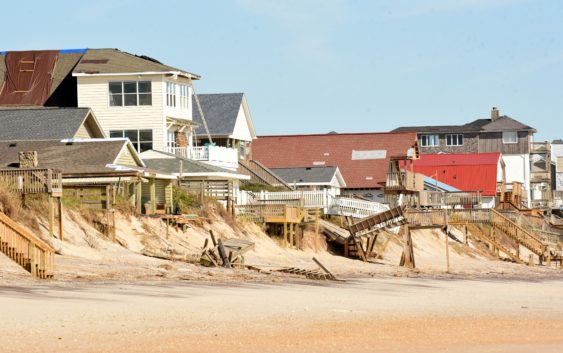- Fake job seekers are flooding the market, thanks to AI
- One set of evacuation orders lifted in Caldwell County after wildfire contained
- 'We gutted every building' | Chimney Rock rebuilding after Hurricane Helene
- 'We gutted every building' | Chimney Rock rebuilding after Hurricane Helene
- Debris from Hurricane Helene provides fuel, complicates containment for spring wildfires
Could Florence prompt another big insurance hike?

Topsail Island Realtors told one could be coming — and soon
PENDER COUNTY — Hurricane Florence. The wettest year on record. Periods of extreme cold and extreme heat in the same year.
With severe weather events becoming more common across the country and in coastal North Carolina, the issue of climate change is poised to get a lot more personal for a lot more people, Adam Upchurch told about 100 or so attendees at the second Surf City Real Estate Trends discussion at the town’s community center on Thursday morning.
That’s especially true for anyone who owns a home.
Home insurers doing business in North Carolina were granted permission to hike rates by 4.8 percent, on average, last year.
Now barely into 2019, those same insurers are asking for another hike, this time in excess of 17 percent, on average. For Florence-ravaged coastal towns like Surf City, according to Upchurch, owner of Marvel Realty Group and current president of the Topsail Island Association of Realtors, the actual affect could be more like 30 percent.
Florence isn’t the sole culprit behind the insurers’ ask; this is a far wider-reaching problem, Upchurch said after his presentation. Recent storm devastation in Puerto Rico, Texas and Florida plays a role, as do drought-driven wildfires on the West Coast.
“Obviously, to have an across-the-board (increase) of 17.4 percent means that some areas are going to be higher,” Upchurch said. “Our area is not a stranger to seeing those kinds of increases.” If the current bill goes through, the home insurance rates in Surf City and other beach communities could go up by as much as 30 percent, he warned.
Surf City home ownership is largely characterized by second-home owners and investors, both groups comprised of people with significant wealth and the financial acumen that goes with it, and a rate hike may not — immediately — have a huge impact, Upchurch said. But an insurance rate increase of this magnitude is likely to have a hefty effect on the market in general. A buyer who today could be approved for a $300,000 mortgage may, tomorrow, qualify only for a $250,000 mortgage, when lenders figure in the additional and long-lasting expense of insuring the property.
After the meeting, Upchurch said he had no information about possible hikes to flood and wind and hail policies, but requested increases in both would not come as a surprise.
“I encourage you to reach out, as soon as you can, to your state representatives,” to voice objections about the rate hike, he advised discussion attendees, mostly real estate professionals. If the bill gets passed in its current form, “it is going to have a big impact that is going to affect everyone’s numbers for 2019 and moving forward. The proposed insurance rate increases “are a great concern,” Upchurch said, “and hopefully we will be able to do something about them.”
All that said, development in Surf City, both residential and commercial, advances apace. Mayor Doug Medlin outlined 10 major projects currently in the Surf City pipeline, including projects that will add nearly 500 new single-family homes, 336 apartment units and a slew of new businesses.
Contact the Metro desk at 910-343-2384 or Breakingnews@StarNewsOnline.com.